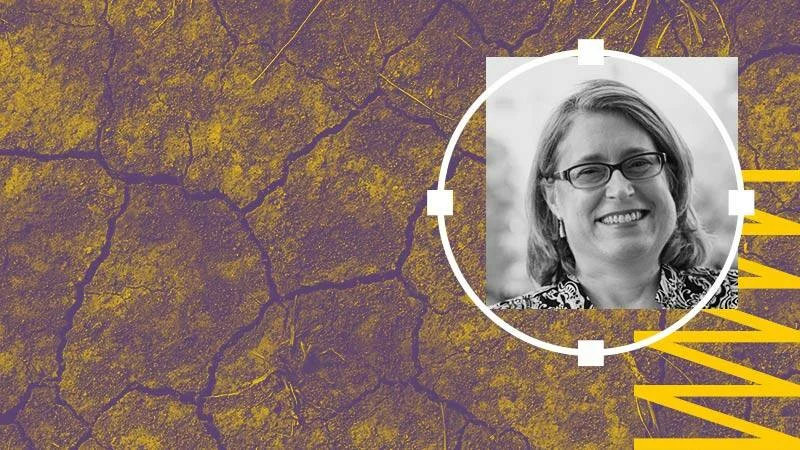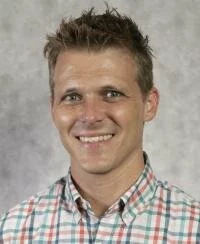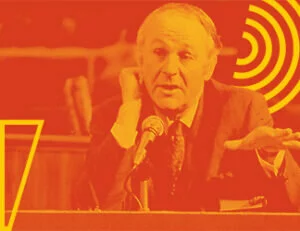“We are our attention.”
So says Daniel Siegal, clinical professor of psychiatry at the UCLA School of Medicine and executive director of the Mindsight Institute. This “stunning claim,” as she calls it, has captured Christina Bieber Lake’s attention.
“We are in a unique time when it comes to things clamoring for our attention,” says Lake, Clyde S. Kilby Professor of English at Wheaton College and one of the Henry Center’s 2021–2022 Resident Fellows. “Many are discovering that we are being sliced up into bits by a variety of unimportant things vying for our attention.” But this superficial problem also raises deeper questions. Contemplating the idea of attention, Lake wonders, “Exactly how have persons been designed to seek after—and to discover—God?” All questions are beginnings, and this question is the beginning of Lake’s Creation Project-sponsored research project, “Designed to Attend. ” The project will explore the nature of our attention, how it’s formed, and how it changes. “What happens in the brain when we pay attention is at the center of it all,” Lake believes. While she’s interested in brain science, she’s also interested in the role of the “literary imagination” in the shaping of our attention, specifically as we search for and discover spiritual truth. “What we attend to has the power to transform us to be more like the object of our attention: Christ.”
It is a truism that all stories have a beginning. Equally so, most beginnings are not absolute, but beckon toward some prequel—faint gestures at an interesting if not immediately required back-story. The beginning of Lake’s project has a similar prequel, one worth recalling.
Incarnational Art: The Making of a Scholarly Career
Lake’s scholarly career, by her own testimony, has been circuitous, yet also focused on a common theme: what it means to be human. Were one to peruse her curriculum vitae, or “course of life,” the question appears in a variety of soundings, often in conversation with various literary and cinematic works in our wider culture. She has spoken and published on topics as diverse as birth marks, human enhancement, the body, artificial intelligence, faith, the future of the humanities, personhood, storytelling, Frankenstein and Zombies, and even Hookup culture, finitude, and vocation—among many others.Lake’s scholarly career, by her own testimony, has been circuitous, yet also focused on a common theme: what it means to be human. Not as evident in her CV, but no less vital to her course of life, Lake’s thinking has been influenced by a wide array of thinkers. Beyond influential literary thinkers like Flannery O’Connor and the poet Denise Levertov, she has been shaped by thinkers as diverse as Aristotle, Thomas Aquinas, Gabriel Marcel, and Hans Urs von Balthasar.
Throughout these many influences and personal artifacts, a unity of life and thought is also discernable. “What unites almost all my scholarly works,” says Lake, “is a concern with the dangers of Gnosticism, particularly techno-gnosticism.” Harold Bloom has called Gnosticism the “American religion,” and Lake agrees. “The desire to free ourselves from our bodies,” she says, “has led us to pursue all the wrong kinds of transcendence—even in the Church.” If Gnosticism is the danger that Lake is trying to bring to our attention, she also proposes a constructive alternative, which she has variously called the literary imagination and incarnational art. “Fiction,” says Lake, “is an inherently incarnational art that defies Gnosticism.” While recognizing that this is a complicated if not controversial statement, she emphasizes literature’s priority of concrete particulars, and more specifically, actual human beings in their particular lives.
The development of these ideas is seen in her three major monographs, spanning roughly fifteen years. In The Incarnational Art of Flannery O’Connor (Mercer University Press, 2005), Lake argues that O’Connor’s literature intentionally combats a gnostic view of the human body, which O’Connor believed had harmed the church in America. If Gnosticism is a problem requiring our attention, moreover, “incarnational art” refers to the way that fiction alternatively shapes our embodied experience, and thus also our understanding of ourselves and God.
From these early overtures into incarnational art and Gnosticism, her next book turned to the relationship between Gnosticism and the biotechnological revolution. In Prophets of the Posthuman: American Fiction, Biotechnology, and the Ethics of Personhood (Notre Dame Press, 2013), winner of the Aldersgate prize and Catholic press book awards (faith and science category), Lake explores how biotech seeks transcendence not through faith in God, but by the illusion of continuous improvement and through the control of technoscience. From there, Beyond the Story: American Fiction and the Limits of Materialism (Notre Dame Press, 2019) was only a short step. That book attends to the personal nature of story-writing, what Lake calls the “dignity-granting valuation of the particular lives of ordinary people.” Says Lake of this book, “Each chapter reveals that while the cognitive sciences have taught us a lot about how we read stories, it cannot explain why we write them.”
Toward a Theology of the Literary Imagination
Nor can it teach us why we read them, which brings us back to attention and the beginning of this new project. “I’m hoping to move my focus from the writer to the reader, but with an even more significant engagement with the sciences,” says Lake. Continuing upon her work on incarnational art and the literary imagination, the question in this project is not Gnosticism or particularity, impersonal or personal;For readers to change their mind about anything, Lake notes, they need to pay special, repeated attention. rather, she’s focusing on the imagination and attention of the recipient. “What happens when we read or experience things habitually or in an extended way, like liturgy?” “How do various major literary forms—story, poetry, and prophetic writings—command our attention, inspire the imagination, and lead us to change?”
For readers to change their mind about anything, Lake notes, they need to pay special, repeated attention. She recalls her own encounter with Richard Powers’s novel The Overstory as one example which forever changed her attention to and concern for the American Chestnut tree. “I’m primarily interested in why and how we change our minds, and what the imagination has to do with it.” Minimally, we need “deep attention,” a muscle or skill increasingly difficult in our advanced technological societies, which tends toward “hyper attention” (distinctions drawn from N. Katherine Hayles). “Part of what we need to re-learn in advanced technological societies is how to focus.”
For Lake’s part, the project is still only a beginning with an unknown ending. But she’s looking forward to working across disciplines, bringing poets, philosophers, scientists, and theologians into a common conversation. She’s not yet certain which voices will be most influential, from neurobiologists, developmental psychologists, neuroscientists, and physicists, to philosophers and theologians. She’s still probing distinct bodies of literature, from neuroscientific accounts of reading to the science of human change. But one thing is certain: Lake is focused on attention, and she’s ready for the deep contemplation. “I’m beyond excited to be a part of a scholarly community with time to contemplate together how the wonder of creation, especially the creation of the human person, can draw us all closer to God.”
2021–2022 Henry Resident Fellows
 |
Christina Bieber Lake Clyde S. Kilby Professor of English, Wheaton College “Designed to Attend: Toward a Theology of the Literary Imagination” |
 |
Gijsbert van den Brink University Research Chair for Theology & Science, Vrije Universiteit Amsterdam “Theological Anthropology in the Anthropocene” |
 |
James M. Arcadi Associate Professor of Systematic Theology, Trinity Evangelical Divinity School “The Priesthood of All Humanity” |
 |
Philip Woodward Assistant Professor of Philosophy, Niagara University “Human Persons: A Contemporary Philosophical-Scientific Synthesis” |
 |
Jon W. Thompson Postdoctoral Research Associate, The Faraday Institute for Science & Religion “Embodied Cognition, Hylomorphism, and the Resurrection of the Body” |




Comments
Be the first one to make a comment!